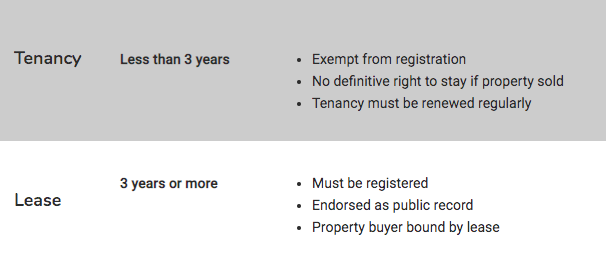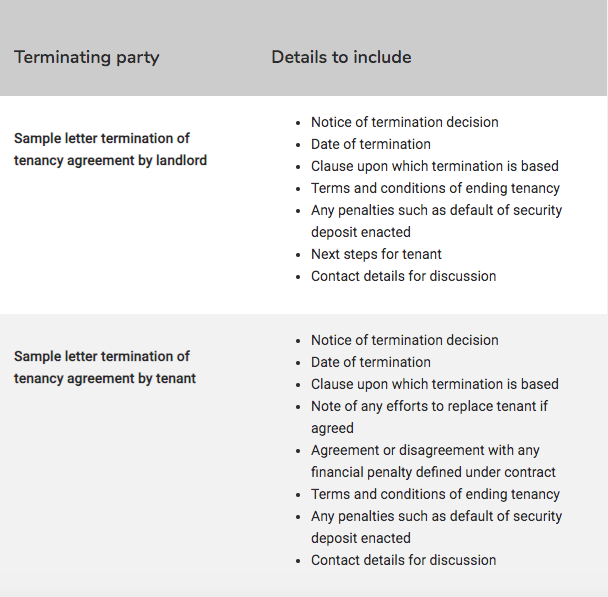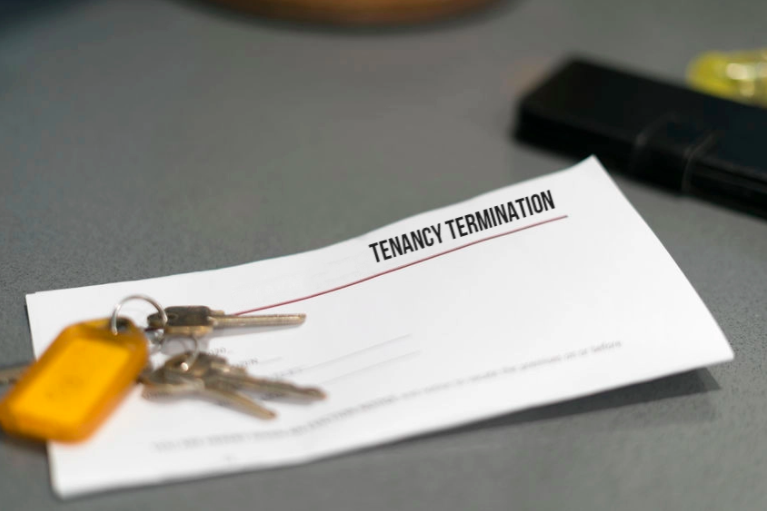You have 6 reasons where an early termination is allowed: If you've let your landlord know within the notice period, have found a replacement tenant, willing to default on security deposit, want to do a tenancy buyout, your landlord has committed a breach, or you use your diplomatic clause.
Sometimes, things in life don’t work out with other people, and you need to go your own way. That doesn't just apply to relationships, but can also be applicable for property-related matters. Here's where a notice of termination of tenancy in Malaysia might come in.
You see, good tenancy agreements are designed to provide a stable and agreed relationship between renters and landlords.
But in truth, there's no specific law or legal framework that governs tenancy arrangements in Malaysia. Looking for a specific Tenancy Act? You won’t find one for now, sorry.
That doesn’t mean that it’s a free-for-all, of course! Malaysia has an established system of tenancy agreements and practices that help keep the rental market working smoothly.
That includes a way for you to end a tenancy, if desired. Without further ado, we're gonna take a look at early termination of tenancy agreement in Malaysia.
Tenancy Or Lease?
First up, let’s consider the question of tenancy or lease, and what it means for your residential rental agreement.
Sometimes these 2 words can get confusing, and often, people think they overlap. In reality, the National Land Code (NLC) defines these terms differently. Thankfully, there’s a very simple explanation as to which is which:

The Power Of Agreement

You might think from the differences above that a tenancy agreement is pointless? You couldn’t be more wrong!
Even though a tenancy isn’t recorded for public viewing like a lease would be, it’s still extremely important to have a written and agreed contract governing your tenancy.
The tenancy agreement will represent the defining legal document of your tenancy. It will set out your agreed rights and responsibilities, including care of the property, length of tenancy, and of course the rental payment amount and frequency.
There is no standard template for a tenancy agreement, but in general terms, it should include the following:
- Tenancy period
- Landlord and tenant details
- Start date
- Option and process for renewal
- Deposit amount
- Rental amount and frequency
- Termination clause(s) and reasons
- Rights and responsibilities of tenant
- Rights and responsibilities of landlord
- Agreed status of fixture/fittings/buildings at start of tenancy

While there is no specific law for tenancy, any such agreement made with an appropriately signed tenancy agreement will be governed by contract law in Malaysia, as per the Contracts Act 1950. That means there’s still a legal framework protecting both parties.
For a tenancy agreement to become a binding legal document, it must be stamped. This ensures that the document is legally recognised in the case of a dispute.
Ending Your Tenancy Early
Any good tenancy agreement should include clauses around terminating a tenancy agreement early. Normally this comes with specific conditions that should be met, or penalties for early termination. Here are some common terms and conditions to look out for:
1) Notice period
A good tenancy agreement should define a notice period to end the tenancy, stating how many months written notice should be given.
2) Replacement tenants
Some agreements will state that the existing tenants must find a replacement to avoid any penalty from ending an agreement early.
3) Default on security deposit
Many tenancy agreements state that the tenant will lose their security deposit if they terminate tenancy early. This provides a financial backup for landlords while they seek new tenants.
4) Tenancy buyout

Some agreements may allow a ‘tenancy buyout’. This essentially means the tenants pay the remaining months of owed rent on the agreement in order to exit early.
This can be fairly simple if you only have a month or two left, but quite expensive if you’re only halfway through a twelve-month tenancy.
5) Landlord breach
Tenancy agreements come with rights and responsibilities of landlords. If they breach the agreement by making any sudden changes to the property or payment terms, then the tenant is legally enabled to cancel the agreement without a penalty.
6) Diplomatic clause
A diplomatic clause may be included to allow for unavoidable events such as being transferred by your employer overseas.
This can be particularly valuable for Malaysia’s expat community. This clause would define what counts as a triggering event, the notice period required to terminate, and any financial compensation required.
Let’s take a simple scenario. You’re a Malaysian citizen living in a rental apartment in Penang. You land your dream job at a tech company in Kuala Lumpur starting next month. Hooray!
So what’s the problem? You’ve got three months left on your RM1,000 per month rental agreement in George Town, and a RM3,000 security deposit with the landlord.

Depending on your tenancy agreement, you may have a few options. First of all, it’s always wise to talk to your landlord soonest possible: be honest, and to the point.
In most cases they’re just trying to run a business and earn some cash, which means they’re not really interested in making things difficult.
It could be there’s a really positive rental market, and they’re happy with you just replacing the tenant. In that case, you go ahead and put in a little effort, replace yourself on the tenancy, and regain your full security deposit.
It might also be that the landlord isn’t happy with your situation, and instead he requires a 2-month notice for termination.
In that case, you may end up paying an overlapping period where you’re renting a new property in KL but also having to pay for the property in Penang.
It could be the landlord asks you to buy-out the tenancy, or just suggests you can move early but default your security deposit. In that case you’re free to move quickly, but you do lose out on the RM3,000.
Unfortunately, it’s unlikely that a diplomatic clause will cover this move, as it’s internally within Malaysia, and is a choice you’ve made rather than one enforced by your current employer.
In any case, it’s always best to communicate and be open with your landlord. You never know, you might find a way to end your tenancy on time, while saving your security deposit!
Notice To Terminate

The definitions above are crucial to your notice to terminate a tenancy early. They will help define the costs and consequences of termination.
If you’ve decided the rental agreement should be terminated early, either as a landlord or tenant, then your next step is sending an official letter.
A letter is a way of recording your decision, and the basis on which it has been made. That helps ensure clear communication for both parties, as well as providing evidence of your decision.

Landlord Rights For Rental Arrears And Termination
If a rental relationship breaks down completely, there are limited options for landlords to legally end a tenancy. Under the Distress Act 1951 (Act 255), a landlord may do the following:
(1) A landlord or his agent duly authorized in writing may apply ex parte to a Judge or Registrar for an order for the issue of a warrant, to be called a warrant of distress, for the recovery of rent due or payable to the landlord by a tenant of any premises for a period not exceeding twelve completed months of the tenancy immediately preceding the date of the application and the Judge or Registrar may make such order accordingly.
(2) Such authority may be in the prescribed form, if any, with such variations as circumstances require, and shall be produced at the time of the application. A power of attorney may be accepted as such authority.
(3) Arrears of rent may be distrained for after the determination of the tenancy, provided that either the tenant is still in occupation of the premises in respect of which the rent is claimed to be due, or any goods of the tenant are still on the premises.
That legal arrangement provides a somewhat complicated way for a landlord to obtain payment of any leftover rental that's owed.

In the ultimate need for eviction, Section 7(2) of Specific Relief Act 1950 provides a means for eviction, with the application of a court order.
7. (1) Subject to subsection (2), a person entitled to the possession of specific immovable property may recover it in the manner prescribed by the law relating to civil procedure. (2) Where a specific immovable property has been let under a tenancy, and that tenancy is determined or has come to an end, but the occupier continues to remain in occupation of the property or part thereof, the person entitled to the possession of the property shall not enforce his right to recover it against the occupier otherwise than by proceedings in the court.
Again, that means a potentially complex legal pathway to eventual recovery of your own property!
Of course these are all worst-case scenarios. In most cases, Malaysia’s rental market ticks along happily, offering homes to those in need, and income to those who invest.
A good tenancy agreement is the foundation on which any rental arrangement should be based. This sets out clear rights and responsibilities for all parties involved. If a dispute arises, then honest communication is the best way to help resolve it!
This article was contributed by PropertyGuru.
_PH_Banner_(Desktop)(1200x180px).png)
.jpeg)




.jpg)
.png)





.jpeg)

